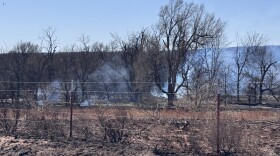An increase in extreme heat in Kansas is making pregnancy more risky, according to a report by the nonprofit advocacy group Climate Central.
Over the last five years, Kansas saw an average of 25 pregnancy heat-risk days annually — defined as those above 95.3 degrees Fahrenheit, warmer than 95% of temperatures recorded in the state. It represents an increase of 10 days annually when compared to a world without climate change, according to researchers.
“It really drove home for me just how intensely climate change is already affecting our health,” Kristina Dahl, vice president of science for Climate Central, said about the findings.
That’s because exposure to extreme heat can lead to a host of pregnancy complications, from preterm birth and pregnancy loss to issues like gestational diabetes. Dr. Caitlin Linscheid, an OB-GYN at the University of Kansas Health System and a fellow with the American College of Obstetricians and Gynecologists, says exposure can be dangerous at all gestational ages.

“In the first trimester of pregnancy, extreme heat can be associated with pregnancy loss,” Linscheid said. “As we get into the second and third trimesters, the concern really becomes more preterm labor and maternal exhaustion and things like heat stroke.”
Babies delivered prior to 37 weeks gestation often require intensive care after birth, and have a greater chance of experiencing health problems like respiratory distress and developmental delays than those born later.
In Kansas, preterm births have trended up in recent years, now representing around 10.5% of all babies — exceeding the 9.4% target recommended by federal health officials. And the rate is significantly higher for Black and Pacific Islander Kansans.
Medical experts say pregnant Kansans living through heat waves should focus on staying cool and hydrated to avoid complications. Exercise particular caution if the National Weather Service issues a heat advisory.
But beyond that, Linscheid says it’s important to listen to your body — and have a way to cool down if you start feeling too hot.

“We don't want any situation where the core body temperature rises,” she said. “But when you’re talking about outdoor heat, it really depends on the individual person.”
Someone exercising or working in the sun, for instance, might risk overheating at temperatures that would be safe for someone sitting on a shady patio. Humidity can make otherwise comfortable temperatures feel much hotter because it’s harder for the body to cool down through sweating.
As heat waves have become more common in Kansas, Linscheid said discussions about the importance of regulating core body temperature during pregnancy have become more routine.
“For some patients, it means avoiding things like hot yoga and hot tubs,” she said. “For patients who work outdoors, it’s making sure they take frequent breaks and have access to cold water; maybe talking to their employer about alternatives (to outdoor work).”
Globally and in Kansas, there are significant disparities in people’s ability to escape extreme heat.

“If you’re not able to afford to run air conditioning or get yourself to an air-conditioned place, then you’re much more vulnerable,” Dahl said. “You find that Black and brown women have a much higher risk of preterm birth even if they’re exposed to the same level of extreme heat as white women.”
The Climate Central report found that many parts of the world have experienced even greater increases in pregnancy heat-risk days than Kansas. Nearly a third of countries now experience an additional month of dangerously hot days, on average, than they would without climate change.
“We need to be preparing for a future with more extreme heat,” Dahl said. “Building that awareness within communities and medical practices of some of the health risks that go along with extreme heat is important.”
Rose Conlon reports on health for KMUW and the Kansas News Service. The Kansas News Service is a collaboration of KCUR, KMUW, Kansas Public Radio and High Plains Public Radio focused on health, the social determinants of health and their connection to public policy. Kansas News Service stories and photos may be republished by news media at no cost with proper attribution and a link to ksnewsservice.org.








